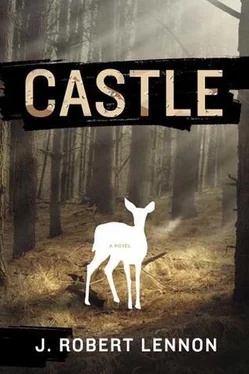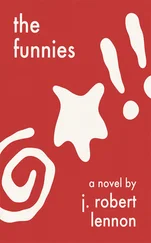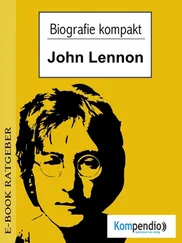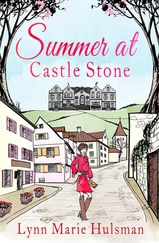She was blinking now, and seemed to have noticed me.
“Are you okay?” I asked. “You had your hand under cold water.”
Her face was shaking now, too, and her shoulders. Her eyes were full of tears.
“Stay here, Mother,” I said. “I’ll clean up for you.”
I left her there, and went into the dining room. I picked up the debris from the floor, and collected all the plates, glasses, and silverware. I removed the tablecloth and took it downstairs and put it in the washing machine. Then I came back and cleaned up the fallen food, including a bit that had somehow gotten stuck on the wall. Perhaps that had been my doing. I turned the water back on in the sink, and washed the dishes, taking periodic breaks to warm my hands over the oven door.
All the while, my mother watched me in silence. She stopped crying after a few minutes and just watched, her eyes following me around the room. I tried to smile at her every now and then. She seemed to appreciate the work I was doing, or trying to do — I was not yet fully adept at housework, as I am now — but there was something in her gaze that was unfriendly. I couldn’t put my finger on it. When the dishes were finished, I went downstairs again and transferred the tablecloth to the dryer, then I returned to the kitchen and took the broom out of the closet.
“Stop it,” my mother said.
She was no longer shivering. The afghan had slipped off one of her shoulders, revealing a mark I hadn’t noticed before: a livid bruise on her neck, just above the clavicle.
“I’m almost finished,” I said.
“Stop it, Eric, please.”
I didn’t understand. I waited for further instruction, but when none came, I put the broom away and turned off the oven. My mother was still watching me with that slightly hostile, perhaps fearful expression. I tried to think of what I had done to displease her, but came up with nothing. So I went to her and embraced her.
I felt her entire body wince underneath the afghan. She patted me, perfunctorily.
“Go to bed, Eric. It’s very late.” Her voice was terribly dry and faint.
“Did you like the way I cleaned up?” I asked, embarrassed even as the words left my mouth.
“Yes, thank you.”
“I’m sorry I spit food at dinner.”
Her only response was a slow nod, which trailed off into a very direct and very discomfiting stare.
“Mother?”
“You know what you are?” she said, her voice flat. “You are your father’s son.” She blinked. “You should go to bed now.”
I paused a long moment before obeying, climbing the stairs to my room in some confusion and unease. When I arrived, I found a small, dark object inhabiting a shallow depression in my pillow. It was the toy locomotive.
The following Saturday morning, my father woke me at the break of dawn. “Get dressed,” he said. “You’re going to see Doctor Stiles.”
I woke slowly, as if rising to the surface of a very deep lake. I could feel a pressure gradually lifting, only for it to be supplanted by nausea, faint at first, then increasingly intense. Light gathered, my head throbbed, and soon I found myself violently sick. I heard the sound of rain and could smell its tang, and I shivered. My vision was blurred. I squeezed my eyes shut, blinked, worked away the haze until I could see my surroundings.
I was inside a wooden cage — the same cage, in fact, that I had noticed on my way into the compound. Rusted iron shackles ringed my wrists and ankles, and my body was naked. And though I lay on my back on the cage’s floor, my shackles were chained to its ceiling, and my limbs were suspended several inches above the ground. My fingers and toes were cold and numb, and my privates had shrunk to a tiny ball of exposed flesh. I felt terribly weak and very thirsty.
I tugged at the chains, but nothing in the resistance I felt suggested that any was liable to break. Furthermore, my movement had the effect of draining what little energy I possessed, revealing in its wake a deep soreness that pervaded every muscle. My thoughts, too, were dull and uncomprehending, and I struggled to remember what I had been doing that led me here. I recalled a fire in a darkened room, but that was all. I coughed now, as though from a memory of smoke, and my throat felt raw.
“Hello, Eric,” came a voice from behind me.
I was startled, and jerked suddenly against the chains, sending another wave of pain washing through my body. I tipped my head back and saw a tall, stooped figure making its way around the cage. It was a man, very old, carrying a wooden chair. The chair was simple, spattered with many colors of paint, and roughened around the edges of the seat by irregular slots, as though someone had been using it as a sawhorse. He set the chair on the flagstones at my feet, lowered himself onto it, and stared at me, his thin, tan hands folded between his bony knees. He wore a torn but close-fitting V-neck sweater and a pair of faded and stained khaki pants. His feet were filthy and bare and his short white hair stood up on his head in all directions.
The old man was Professor Avery Stiles, of course. His face was the same, and when I saw it, I remembered the events that led to my capture, along with the grim reminiscences I indulged as I fell unconscious. I gasped for breath. Doctor Stiles smiled, a gentle, sad expression that nevertheless appeared to harbor great strength. He opened his mouth to speak.
“What do you want from me?” I demanded, and his eyebrows rose, as though with approval at my interruption.
“I might ask you the same, Eric.”
“I don’t understand.” My voice was wet and strangled. I turned my head and spat.
He cocked his head, blinking. Then he straightened, leaned back, and crossed his arms over his chest. Through the sweater I could see his biceps, thin and stringy. His jaw moved involuntarily.
“I was sorry,” he said, “to hear about your parents.”
I merely stared. When ten seconds or so had passed, he appeared mildly surprised and, again incongruously, somehow pleased.
“I had thought your father was a kindred soul,” he went on. “But it appears I was mistaken. A tragedy.”
I tried to speak, but all that emerged was a low, spitting growl.
After a moment’s thought, he leaned forward, gripping his knees. “I understood that your father possessed a great hidden well of anger. But I never imagined he might commit such an act.” Almost as an afterthought, he added, “She was a lovely woman, your mother.”
“Her death,” I managed at last, “was an accident.”
Again the eyebrows went up. “And his own?”
“He couldn’t bear the guilt.”
As I said this, I recalled the bruise I had seen on my mother’s neck, and felt a shiver of revulsion run through me. Professor Stiles studied my movement with a clinical eye.
“Uncomfortable, Eric?”
I said nothing.
“You should be able to free yourself, you know.”
Again, I offered no response.
He held out his palms, his long arms like the wings of some great, ancient bird. “I have confidence in you, Eric. You’ll find a way.”
I gathered my strength and tried to spit at him. But my dehydration was too advanced. Furthermore I sensed that, even had I been successful, he would barely have noticed. His imperviousness was absolute.
He studied me for some seconds, his face knotted with curiosity, and apparent, but surely false, concern. He stroked his white-bristled chin in a parody of deep thought. He leaned forward farther still, until his narrow face was framed by two of the wooden bars.
“Eric,” he said, “I think you need to ask yourself what it is, exactly, you’re doing here.”
I began to feel myself growing tired and nauseous again. I inhaled deeply, to clear my head, but the only tangible result was dizziness. I coughed, gasped, and then failed to suppress an enormous yawn. “You came,” I said. “To me. To my house.”
Читать дальше











